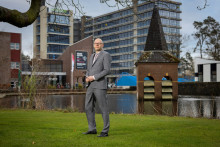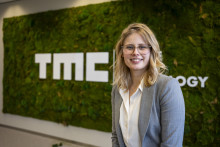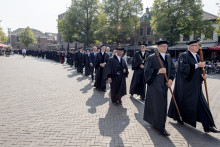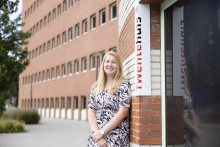Bleker is wearing a striking hat as he enters the Enschede town hall. He bought the hat in his first week as mayor from UT Professor Emeritus Dave Blank, who has run a hat shop in the centre of Enschede ever since he took retirement. For Bleker, visiting the shop is also a chance to reunite with an old acquaintance: he knows the renowned former professor from his time spent as an alderman and student in Twente.
During his first month as Mayor of Enschede, in February 2022, Bleker held lots of meetings like this, or rather reunions. ‘Coming back felt like slipping on a pair of old comfy slippers,’ he says. ‘But it is also great that so much has changed over time. I come across lots of new faces and I’m impressed by the great plans that are in place, like the building plans for thousands of homes for young people and students dotted around the city centre.’
The information day was fun, so I was quick to make a decision. I accidentally went to the information session for Public Administration, but I ended up thinking that if this programme seemed fun, then the Management course must be too.
In his first month, the new mayor also visited the university campus. ‘I saw the emergency accommodation for students on the Witbreuksweg and chatted to the builders. I told them that when I was alderman, I’d given the go-ahead for the construction of Sky and Box.’ Incidentally, his visit to the campus is not particularly extraordinary considering that Bleker still returns to the campus each year. ‘I come back for the water polo tournament of the Piranha swimming club, where I was President in my student days. I would cycle from the station to the campus and marvel at how many years it had been since I had cycled that route as a student. That always felt so familiar.’
Student city of Enschede
Bleker grew up in Appingedam, a small town in Groningen. He chose Enschede to study in because his broad interests made it difficult for him to choose which course he wanted to follow. ‘I was told that the chance of getting in for Industrial Engineering and Management in Enschede was higher than Groningen. The information day was fun, so I was quick to make a decision. I accidentally went to the information session for Public Administration, but I ended up thinking that if this programme seemed fun, then the Management course must be too!'
 The first thing he did as a student in Twente was to sign up for the water polo competition. This meant that he would only return to Groningen in the autumn and over the Christmas holidays. ‘That suited the campus student lifestyle. Many student cities were – and are – much more boring than Enschede, because lots of students stayed in Enschede during weekends. In my student days, Enschede meant the campus, the city centre and De Vluchtestraat. That is where I lived, except early on. At the start, I shared a house with fourteen students on the campus, on Witbreuksweg.’
The first thing he did as a student in Twente was to sign up for the water polo competition. This meant that he would only return to Groningen in the autumn and over the Christmas holidays. ‘That suited the campus student lifestyle. Many student cities were – and are – much more boring than Enschede, because lots of students stayed in Enschede during weekends. In my student days, Enschede meant the campus, the city centre and De Vluchtestraat. That is where I lived, except early on. At the start, I shared a house with fourteen students on the campus, on Witbreuksweg.’
A rich campus life
As a student, Bleker didn’t just sit working with his nose in a book – quite the opposite, in fact. He was Chair of Piranha and headed up the Council for Campus Facilities, which was a kind of precursor to the Student Union. ‘The Council was a campus board with three councillors and a chairman, “the campus mayor”. It dealt with everything to do with housing, culture and sports. I remember that at the time, we were busy investing in artificial turf pitches. It was a great learning experience for me.’
In fact, much more than studies, his emphasis was on student life. ‘I was really engrossed in the rich campus life. When the study association went on a trip abroad, I often didn't even know about it.’ Bleker doesn’t think that his Management course was particularly fascinating, except for one optional subject. ‘I found the teacher, Maarten van Riemsdijk, especially interesting. He was pursuing a PhD at the time and I worked for two years as a lecturer in his department. I still sometimes talk to people now who say they were taught by me and it's rather funny.’
As an alderman in Roombeek, I was involved in the reconstruction work that took place after the fireworks disaster. The way in which all the residents got involved was exceptional. It inspired me enormously.
Dog poo policy
In his years as a UT lecturer, Bleker also sat on the city council. ‘That's when the whole city really started to come alive for me; as a student, I was mainly focused on the campus and the city centre. I felt most connected to the PvdA [Labour Party]. I wanted to work on something with the party and so I started to focus on the dog poo policy. Clutching my two sheets of paper outlining a policy based on the one in Deventer, the group set to work. A majority of the council followed suit. The party then asked if I wanted to be on the list and I said yes, which is how I came to be a municipal councillor at the age of twenty-six.’
After a stint on the municipal council, he became an alderman in Enschede. Bleker then became a dijkgraaf, a president of the executive board of University of the Arts and, ultimately, a mayor. In fact, the career path that 54-year-old Bleker has followed is extraordinary. Moreover, it is varied and diverse. What does he think is the common thread running through all these different roles? ‘More than anything this demonstrates the breadth of my interest. All of these roles are public tasks. I never thought about there being a common thread before, but what always excited me was the engagement of people and residents based in one particular area. As an alderman in Roombeek, I was involved in the reconstruction work that took place after the fireworks disaster. The way in which all the residents got involved was exceptional. It inspired me enormously. Even as a dijkgraaf, the broad perspective of residents always influenced my thinking.'

An engine to drive the region
In his own words, Bleker wants to focus on safety during his first months as Mayor of Enschede. However, maintaining a link between the city and UT is also one of his tasks. ‘In the coming period, for example, we will be making important decisions about investments in the Kennispark. The UT is an important driving force for the region. It generates new technology and entrepreneurship as well as diversifying business.’ That is why it is important that students decide to stay and live in Twente once they have completed their studies, says Bleker. It is precisely this idea of retaining talent in Twente, however, which has caused issues for years. ‘On the one hand, it is all very logical: students feel like a change after they have finished studying. Nevertheless, we would like to try and entice our talent to stay in our region. It is a great city to live in, so ensuring there are sufficient career opportunities is key for this.’
This also applies to job opportunities that are available for partners, as Bleker knows. ‘We want to invest over the coming years to ensure we have better links with other working regions, such as a good train connection between Zwolle, Enschede and Münster. Housing here is more affordable than in the West, so that is something that we can highlight to students.’ And it is not just affordability that plays a role, explains Bleker. ‘My wife and I are returning to Twente now, but I know quite a few people who are also coming back after spending several years in the Randstad. There is a less harsh atmosphere here. They would rather have their children grow up in Twente than in Schiedam, for example.’






